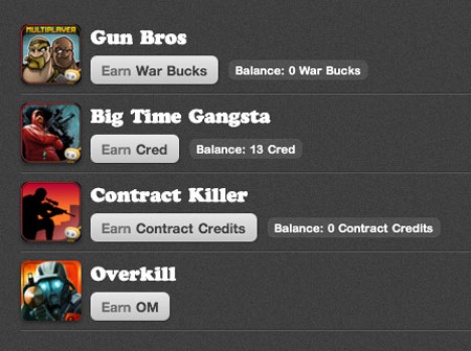Anyone with any amount of cash was funnelling it through Tapjoy, via its incentivised downloads system to drive game downloads - gaining organic activity as their games got then placement on the App Store charts.
Ironically, though, it proved to be just too perfect.
It was so scalable and so successful that Tapjoy ended up owning the charts: never a good longterm situation when you're operating on Apple's patch.
The result was incentivised downloads were banned on iOS, with Apple overhauling its chart algorithms to emphasis activity rather than pure downloads, and the industry was reduced to less effective methods of advertising and promotion.
Of course, incentivisation still works fine on Google's exploding Android ecosystem, but knowing the system was loved by advertisers and consumers - after all, they got virtual currency for 'free' - Tapjoy appears to have taken a backwards step to come up with a new, a better plan.
Step into the light
"We're recasting our brand image. Tapjoy's no longer a B2B company. We're firmly B2C now," explains Peter Dille, Tapjoy's chief marketing officer, and someone who knows something about that business, previously being responsible for Sony's PlayStation marketing in North America.
"We're solving a huge problem for consumers in terms of app discovery. An app store is not a natural way to shop for content."
The fulcrum of Tapjoy's new focus is its Tapjoy consumer website.
It can be accessed via PC, or via mobile devices through any HTML5 browser. There's also a dedicated Android app.
Build it, pay them to play
Acting as a hub, Tapjoy says eventually this will offer social interactivity with friends, challenges and tournaments etc. The current version is labelled a beta or "thin slice of the vision".
What's really significant, however, is that logging on with an iOS device, you'll install a piece of code that will enable Tapjoy to see what games and apps you have installed. It works in a similar manner but more elegantly if you're using the standalone Android app.
This provides Tapjoy with the ability to recommend new apps and games that if you download, you'll be rewarded with virtual currency in the games it knows you're already playing.
Neatly, this is displayed in terms of your currency balance in the freemium games you're playing; tapping on a game will then provide you with an offer wall of actions that will earn you additional currency in those titles.

The only disadvantage compared to Tapjoy's original method is you're carrying out these actions within an online hub rather than doing it in-game.
Either way, it plays straight into human psychology in terms of getting something for 'nothing'.
Win-win
Tapjoy calls this process the 'Mobile Value Exchange', a term it's apparently trademarked.
The exchange process is explained in this manner:
'Consumers engage with publisher apps and advertiser placements by watching videos, signing up for subscriptions, installing apps and more, all in exchange for virtual currency. Advertisers connect with a very active and engaged audience base, and publishers can generate revenues to help support their free-to-play applications.'
Driving the market
What's really interesting, though, is exactly how Tapjoy will use this exchange power.
Sure, it could continue as before, just pointing users towards the games that its advertisers are paying for, but Dille says he expects the company to look more widely in terms of its recommendations.
"Using methods such as our Staff Picks and App of the Day recommendations, we want to highlight content that we think people will like, not just our partners," he explains.
Of course, he also adds, "We hope it will also be a business development driver for us; that companies will see the kind of traffic we can drive, and then look for further opportunities to work with us."
Equally, while the Mobile Value Exchange(tm) model works best for freemium games, as users are more likely to download them, Dille says that, depending on the exchange value offered, there's no reason premium content couldn't be similarly promoted.
The first million
Still, with the service only having just launched, the key thing for Tapjoy, in the short term, will be to drive consumer uptake to demonstrate - especially on iOS - that it can again drive the hundreds of thousands of downloads that the big freemium publishers crave.
More significant will be the impact the system could have as a cross platform network for iOS, Android, HTML5 content etc, also combining strong social features - think OpenFeint or Game Center - with Mobile Value Exchange(tm).
"This is about a big vision for app discovery," Dille argues.
"This has the potential to be very disruptive."






















